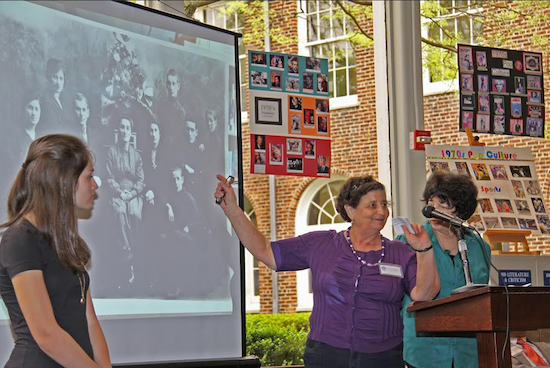Poly Prep’s Jewish Caucus hosts Holocaust Panel

Poly Prep’s Upper School Jewish Caucus hosted a Holocaust Panel on May 15 in its Joseph Dana Allen Library and invited the Poly community to hear the recollections of two survivors and collectively honor the solemn promise, “never again.”
“While the Jewish Caucus celebrates Jewish heritage and culture in all their manifestations, past and present, we feel it [is] necessary to provide an opportunity for the Poly community to hear first-hand accounts of the Holocaust from the generation which survived them, and whose advancing age will necessarily lessen this opportunity in the years ahead,” Jewish Caucus advisers Elijah Sivin (Co-Director of Community Service; History) and Michal Hershkovitz (History Department Chair) wrote in the invitation to the panel.
The Holocaust panel began with Zachary Kimmel (’17) reading a poem he had written, “My Grandfather,” for which he won a 2014 Scholastic Art & Writing Silver Key Award.
Jewish Caucus member Katie Pazushko (’15) read the story of survivor Ester Mark, who could not participate in the panel because of health issues. Mark grew up in Hungary and lost many family members in the Nazi concentration camp at Auschwitz, where she was imprisoned. Mark was a victim of Dr. Josef Mengele’s unscientific and often deadly experiments on prisoners at the camp. After being liberated from Auschwitz, Mark moved to Israel, but immigrated to New York in 1956.
Mark is still haunted by what happened to her in Auschwitz. Pazushko read her words: “The story of this time has no end,” and ended with Mark’s admonition, “Stay in peace with each other. And don’t forget. Never, ever forget the importance of kindness. My only hope is that no child will ever have to know war again.”
Philip Bialowitz was able to attend the Holocaust Panel, and he shared a harrowing story of his time at the Sobibor death camp in Poland. Bialowitz began by telling the audience of students and faculty that filled the library, “Little has changed since the Holocaust. Our world is still broken.”
Bialowitz, who was born in Poland, was 14 when, as he said, “My childhood was lost forever.” He lost family members to the gas chambers, but he and an older brother survived at Sobibor, because his brother told the Nazis that he was a pharmacist and Philip was his assistant. The ruse saved them from death when they arrived at the concentration camp. Philip Bialowitz was put to work guiding the new arrivals to the camp as they left the trains and took their luggage and valuables for inspection. Bialowitz described his pity for the arriving Jews who were unaware of how close they were to death. He said they were told to fill out postcards to be sent to relatives left behind telling them that they had been resettled at the camp and were safe. A short time after, the new arrivals were guided to “showers” that were really gas chambers.
In 1943, a group of prisoners at Sobibor, led by Leon Feldhendler, began to plan an escape. The men told the Nazi officers, one by one, that they had found incredible valuables among the luggage and, as each SS man entered the room, several Jews stabbed him to death. Bialowitz and his brother were among 200 men who escaped into the surrounding forest during the revolt. The leaders had told the men, “If anyone survives, bear witness to what is happening here.” Only 42 of them survived to the end of the war, Bialowitz said, with tears in his eyes. His voice cracking, Bialowitz told his audience, “Here I am a living witness. I have dedicated my life to telling this story of people hidden from the conscience of the world.”
Libora Engelstein, the grandmother of Jewish Caucus member Gabrielle Shpilsky (’15,) was the next guest. Shpilsky read a statement by her grandmother. “There is no human experience like war,” Shpilsky read. “By both sides, we were hated.” Engelstein’s grandmother, who lived with her family in Ukraine, was stranded in what is now Belarus at the start of the war. The fate of Engelstein’s Uncle Michael, whose photo was projected on a screen, was unknown to the family until 42 years after the war, she said.
The Holocaust Panel concluded with the reading of a poem, “Mother,” (Author Unknown) by Alexandra Nava-Baltimore (’20.)